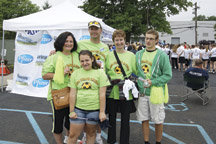Sept. 20, 2009 proved to be a pivotal day for two New Jersey men who will never meet, but whose lives will forever be intertwined.
That day, Jersey City native Edward Cummings received a phone call that an organ donor from the New Jersey donor and tissue registry was a match for him, and had a healthy kidney available and ready for transplant.
Cummings, his wife, and their two children prepared for Edward’s surgery and were guardedly optimistic about what it might mean for his health and quality of life.
“His mother told me, ‘He made that choice. You were kept here for a reason. And as live as you live, he lives.’ ”
____________
Fateful day
Cummings, 43, had battled Type 1 diabetes since he was diagnosed when he was 18.
“Growing up in Jersey City, you think you’re invincible,” he said. “But then you find out something like this.”
Cummings tried to stay on top of his diabetes. But in 2005, he had a heart attack. Two weeks later, he suffered a stroke. In early 2006 he was admitted to the hospital with a blood sugar count of 1,400. Cummings had to be put on life support after slipping into a coma, during which he suffered a second stroke.
It was while recovering that a doctor told Cummings his kidneys had failed. In the fall of 2008, Cumming was told it was time to add his name to organ donation lists.
In need of a new pancreas and one kidney, Cummings added his name to state organ registries in New Jersey, New York, Pennsylvania, and Maryland. He finally received the call he had been waiting for on Sept. 20, 2009.
“They call the top three people on the list, because they never want to waste an organ,” Cummings remembered. “They called and told me they had a kidney/pancreas available. They said they’d call me back, which they did at three o’clock in the afternoon. They said, ‘If you want it, we’ll give it to you.’ Fifteen minutes later, I was told to report to the hospital at midnight.”
Cummings was wheeled into the operating room at 5 a.m.
“I was operated on on a Monday. I was home Friday,” said Cummings, whose surgery took place at Robert Wood Johnson University Hospital in New Brunswick. Ironically, Cummings received calls about two other available kidneys later that month. “It must have been my time.”
A life-saving choice
Time, however, had come to end for Keshawn Brown.
A native of Kingston, Jamaica, Brown received a punch to the head on that September day in 2009. The punch caused him to fall to the ground, and he hit his head on the concrete beneath him. He fell into a coma.
“He had learned about organ donation when he got his [New Jersey drivers] license,” said Cummings, who met Brown’s family in April. At the time, “His mother was totally against organ donation. She just wanted to take him home and bury him.”
Currently, there are nearly 5,000 people registered with the New Jersey Sharing Network to receive an organ or tissue donation, according to Melissa Honohan, the organization’s vice president of administration and public policy. The organization has assisted more than 20,179 people find a tissue or organ match since the organization was founded in 1987.
180-degree change
Since receiving his transplant, Cummings, a former electrician who is now on disability, has spent time on the public speaking circuit, teaching others about the importance of organ and tissue donation.
“I don’t want money for this. I don’t expect money for it. I do it because it’s a great cause and it kept me alive,” said Cummings. “If I can touch one person, and convince them to be an organ donor, then that’s my pay.”
Recently, Cummings and his family organized a team to walk in the New Jersey Sharing Network Foundation’s inaugural 5K run. The event, held in New Providence, raised $428,000 which will be used to further organ and tissue donation in New Jersey.
Even Brown’s mother has changed her mind about donation since meeting Cummings in April.
“I wrote her a letter and spoke to her on the phone. And now that she’s met me it’s been a [180] degree change. She now totally supports organ donation,” he said. “When I met her, I had so much guilt in me, knowing that I’m alive and a 20-year-old kid had to die for me to stay alive. But his mother told me, ‘He made that choice. You were kept here for a reason. And as live as you live, he lives.’ ”
E-mail E. Assata Wright at awright@hudsonreporter.com.
